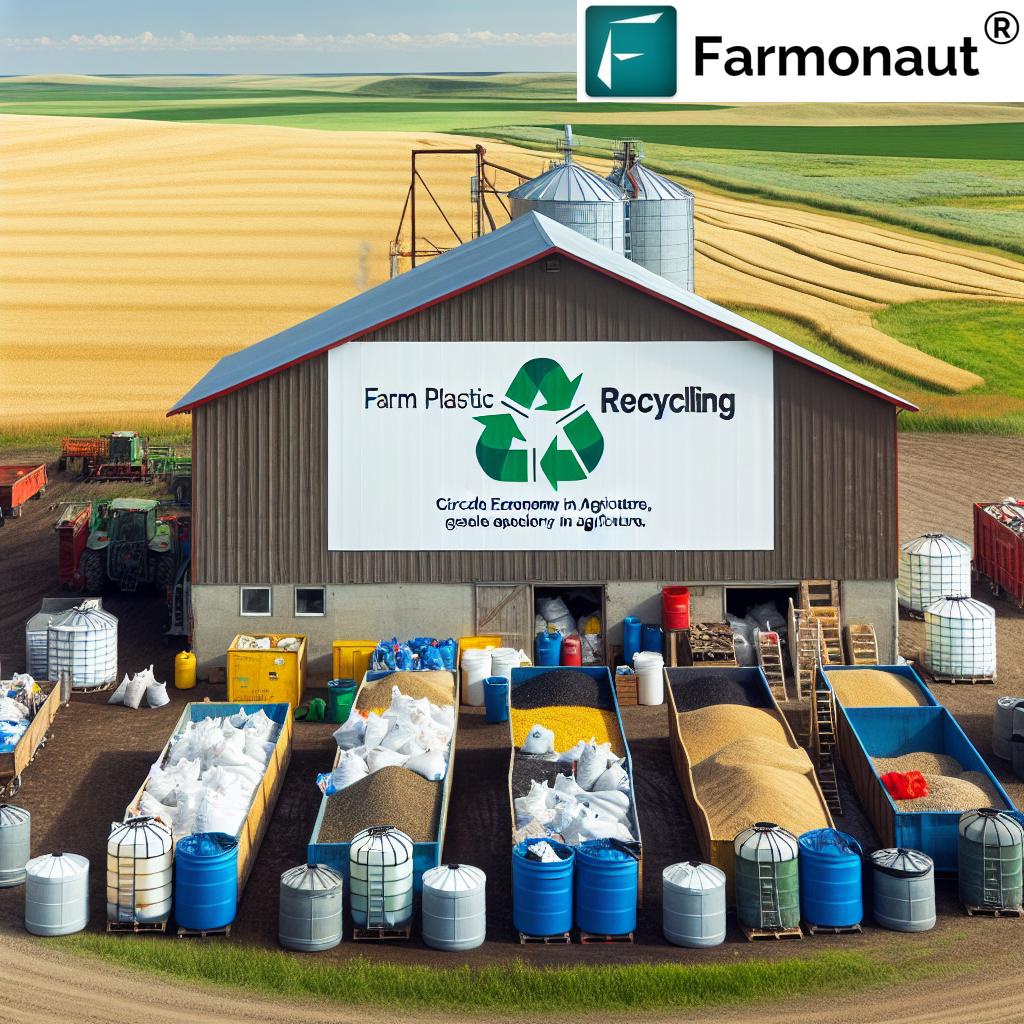Canadian Seed Industry Leader Drives Agricultural Digital Transformation: Innovations in Certification Systems
“The Canadian seed industry’s digital transformation impacts over 3,500 seed growers nationwide, revolutionizing certification processes.”
In the ever-evolving landscape of Canadian agriculture, a significant shift is taking place that promises to reshape the future of our seed industry. The Canadian Seed Growers’ Association (CSGA) has recently welcomed new leadership, marking a pivotal moment in the agricultural digital transformation journey. This change heralds a new era for the pedigreed seed system, emphasizing innovation and modernization in seed certification processes. As we delve into this exciting development, we’ll explore how it aligns with broader trends in Canadian agriculture innovation and its potential impact on our position as an agri-food industry leader both domestically and internationally.
The Dawn of a New Era in Canadian Seed Industry
The appointment of new leadership at the CSGA is more than just a change of guard; it represents a strategic move towards embracing cutting-edge technologies and innovative practices in the seed industry. With extensive experience in agribusiness leadership, the incoming executive brings a fresh perspective and a vision for leveraging technology to address the pressing challenges facing the agricultural sector.

This transition comes at a crucial time when the global agricultural landscape is rapidly evolving. The need for efficient, sustainable, and technologically advanced farming practices has never been more apparent. By focusing on member needs and industry advancement, the association aims to streamline core services and reduce bureaucracy, paving the way for a more agile and responsive seed certification system.
Embracing Agricultural Digital Transformation
At the heart of this leadership change is a commitment to driving agricultural digital transformation. This encompasses a wide range of technological advancements, from precision agriculture techniques to blockchain-based traceability systems. The CSGA’s new direction aligns perfectly with the growing trend of integrating digital solutions into every aspect of the agricultural value chain.
Key areas of focus in this digital transformation include:
- Advanced Seed Certification Systems: Implementing state-of-the-art digital platforms for faster, more accurate certification processes.
- Data-Driven Decision Making: Utilizing big data and analytics to inform policy decisions and improve industry practices.
- Enhanced Traceability: Adopting blockchain technology to ensure transparency and security in seed production and distribution.
- Remote Sensing and Monitoring: Leveraging satellite technology for improved crop management and yield prediction.
In this context, it’s worth noting the role of innovative companies like Farmonaut in supporting this digital transformation. Farmonaut’s cutting-edge remote sensing technology aligns perfectly with this push towards agricultural modernization, offering farmers valuable insights for improved crop management and sustainability.
Modernizing Seed Certification Processes
One of the primary focuses of the new leadership is the modernization of seed certification processes. This initiative aims to streamline operations, reduce paperwork, and increase efficiency across the board. By leveraging digital technologies, the CSGA plans to:
- Implement online platforms for seed growers to submit certification applications and track their progress in real-time.
- Utilize AI and machine learning algorithms to enhance the accuracy and speed of seed quality assessments.
- Develop mobile applications that allow field inspectors to input data directly from inspection sites, reducing delays and potential errors in reporting.
These advancements in seed certification systems are expected to significantly reduce processing times, improve accuracy, and ultimately enhance the quality and reliability of Canadian pedigreed seeds.
Collaborative Strategies for Industry Advancement
The new leadership’s commitment to collaborative strategies is a cornerstone of their vision for the CSGA. This approach recognizes that the challenges facing the agricultural sector are complex and multifaceted, requiring input and cooperation from various stakeholders. Some key collaborative initiatives include:
- Industry Partnerships: Fostering closer ties between seed growers, research institutions, and technology providers to drive innovation.
- Cross-Sector Collaborations: Engaging with related industries such as agtech, biotechnology, and environmental sciences to leverage diverse expertise.
- International Cooperation: Strengthening Canada’s position in the global seed market through strategic international partnerships and knowledge exchange programs.
These collaborative efforts are crucial for ensuring that Canada remains at the forefront of agricultural innovation and continues to produce high-quality, sustainable seed products for both domestic and international markets.
“Canada’s agri-food exports, valued at $82.2 billion in 2022, are set to benefit from modernized seed certification systems.”
Addressing Agricultural Sector Challenges
The incoming leadership team at CSGA is well aware of the multitude of challenges facing the agricultural sector. Their vision for leveraging technology and innovation is directly aimed at addressing these issues head-on. Some of the key challenges they plan to tackle include:
- Climate Change Adaptation: Developing resilient seed varieties that can withstand changing climate conditions and extreme weather events.
- Sustainable Farming Practices: Promoting seed varieties and cultivation methods that reduce environmental impact and conserve resources.
- Food Security: Ensuring a stable and sufficient supply of high-quality seeds to support Canada’s food production capabilities.
- Market Competitiveness: Enhancing the global reputation and market share of Canadian seeds through improved quality and certification processes.
By focusing on these challenges, the CSGA aims to not only strengthen the Canadian seed industry but also contribute to broader agricultural sustainability and food security goals.
Farmonaut Satellite & Weather API
The Role of Technology in Agricultural Advancement
Technology plays a pivotal role in the CSGA’s vision for the future of Canadian agriculture. The integration of advanced technologies is expected to revolutionize various aspects of seed production, certification, and distribution. Some key technological advancements being considered include:
- IoT Sensors: Deploying Internet of Things (IoT) devices in fields to monitor soil conditions, moisture levels, and plant health in real-time.
- Artificial Intelligence: Utilizing AI algorithms for predictive analytics in crop yield forecasting and pest management.
- Drone Technology: Employing drones for aerial surveying and monitoring of seed crops, enhancing inspection efficiency.
- Blockchain for Traceability: Implementing blockchain solutions to ensure transparency and traceability throughout the seed supply chain.
These technological advancements align with the services offered by innovative companies in the agritech space. For instance, Farmonaut’s satellite-based farm management solutions provide valuable insights for crop health monitoring and resource management, complementing the CSGA’s efforts to modernize the industry.
Empowering Canadian Seed Growers
At the core of the CSGA’s mission is the empowerment of Canadian seed growers. The new leadership recognizes that for any industry-wide transformation to be successful, it must directly benefit those on the ground. To this end, several initiatives are being planned:
- Educational Programs: Providing seed growers with training and resources to adapt to new technologies and certification processes.
- Digital Platforms: Developing user-friendly digital tools that allow growers to easily access information, submit applications, and track certification progress.
- Financial Support: Exploring ways to provide financial assistance or incentives for growers adopting new technologies or sustainable practices.
- Networking Opportunities: Creating platforms for seed growers to connect, share knowledge, and collaborate on innovative projects.
By focusing on these areas, the CSGA aims to ensure that Canadian seed growers are well-equipped to thrive in an increasingly digital and technologically advanced agricultural landscape.
Enhancing Canada’s Position in the Global Agri-Food Market
The digital transformation of the Canadian seed industry is not just about domestic improvements; it’s also about strengthening Canada’s position in the global agri-food market. The new leadership at CSGA recognizes the importance of maintaining and enhancing Canada’s reputation as a leader in agricultural innovation and quality seed production. Some key strategies to achieve this include:
- International Standards Alignment: Ensuring that Canadian seed certification processes meet or exceed international standards, facilitating easier trade and export opportunities.
- Research and Development: Investing in cutting-edge research to develop new seed varieties that address global challenges such as climate change and food security.
- Digital Marketing and Branding: Leveraging digital platforms to showcase Canadian seeds’ quality and sustainability to international markets.
- Trade Partnerships: Fostering strategic partnerships with international seed organizations and agri-food companies to expand market reach.
These efforts are crucial in maintaining Canada’s competitive edge in the global agricultural sector, ensuring that Canadian seeds continue to be sought after for their quality, reliability, and innovation.

The Future of Canadian Agriculture: A Vision of Innovation and Sustainability
As we look to the future, the digital transformation led by the CSGA sets the stage for a new era in Canadian agriculture. This vision encompasses:
- Smart Farming Practices: Widespread adoption of precision agriculture techniques, reducing resource use and environmental impact.
- Data-Driven Decision Making: Utilizing big data analytics to inform everything from crop selection to market strategies.
- Sustainable Seed Production: Developing and promoting seed varieties that are more resilient to climate change and require fewer inputs.
- Integrated Supply Chains: Creating seamless, digitally-enabled supply chains from seed production to end consumers.
This forward-thinking approach positions Canada to not only meet the challenges of modern agriculture but to lead the way in developing solutions for global food security and sustainable farming practices.
Canadian Agricultural Digital Transformation Milestones
| Year | Milestone | Impact on Industry |
|---|---|---|
| 2020 | Launch of National Agricultural Geospatial Intelligence System | Enhanced precision farming capabilities across Canada |
| 2021 | Implementation of blockchain for seed traceability | Improved transparency and trust in seed supply chain |
| 2022 | Introduction of AI-powered crop yield prediction models | More accurate forecasting and resource planning for farmers |
| 2023 | New leadership at Canadian Seed Growers’ Association | Accelerated digital transformation and modernization of seed certification processes |
| 2024 (Projected) | Launch of nationwide digital seed certification platform | Streamlined certification process, reduced bureaucracy, and faster turnaround times |
| 2025 (Projected) | Integration of IoT sensors in 50% of Canadian farms | Real-time monitoring and data-driven decision making becoming industry standard |
The Role of Remote Sensing in Modern Agriculture
As we embrace this new era of agricultural digital transformation, it’s important to highlight the significant role that remote sensing technology plays in modern farming practices. Remote sensing, particularly satellite-based solutions, offers unprecedented insights into crop health, soil conditions, and overall farm management. This technology aligns perfectly with the CSGA’s vision for a more data-driven, efficient agricultural sector.
Remote sensing technologies provide numerous benefits to the seed industry and agriculture at large:
- Crop Health Monitoring: Satellite imagery can detect early signs of crop stress, disease, or nutrient deficiencies, allowing for timely interventions.
- Resource Optimization: By providing detailed information on soil moisture and crop water needs, remote sensing helps optimize irrigation and reduce water waste.
- Yield Prediction: Advanced algorithms can analyze satellite data to predict crop yields with increasing accuracy, aiding in harvest planning and market forecasting.
- Land Use Planning: Remote sensing data helps in identifying suitable areas for different crop varieties, supporting sustainable land use practices.
Companies like Farmonaut are at the forefront of this technology, offering solutions that make precision agriculture more accessible and affordable for farmers of all scales. Their satellite-based farm management tools provide valuable insights that complement the CSGA’s efforts to modernize the seed industry.
Embracing Sustainability in Seed Production
As the agricultural sector faces increasing pressure to reduce its environmental footprint, the CSGA’s new leadership is placing a strong emphasis on sustainability in seed production. This focus aligns with global trends towards more eco-friendly farming practices and responds to growing consumer demand for sustainably produced food.
Key sustainability initiatives in the seed industry include:
- Water-Efficient Varieties: Developing and promoting seed varieties that require less water, reducing strain on water resources.
- Pest-Resistant Crops: Breeding seeds that have natural resistance to pests, reducing the need for chemical pesticides.
- Carbon Sequestration: Exploring seed varieties that contribute to increased carbon sequestration in soil, helping to mitigate climate change.
- Biodiversity Preservation: Maintaining a diverse seed bank to ensure genetic diversity and resilience in the face of changing environmental conditions.
These sustainability efforts not only benefit the environment but also contribute to the long-term viability and profitability of Canadian agriculture. By leading in sustainable seed production, Canada can further strengthen its position as a responsible and innovative player in the global agri-food market.
Challenges and Opportunities in Agricultural Digital Transformation
While the digital transformation of the Canadian seed industry presents numerous opportunities, it also comes with its own set of challenges. Addressing these challenges effectively will be crucial for the success of the CSGA’s vision. Some key challenges and opportunities include:
- Digital Literacy: Ensuring that all stakeholders, especially older farmers, are comfortable with new digital tools and platforms.
- Data Security and Privacy: Implementing robust systems to protect sensitive agricultural data from cyber threats.
- Infrastructure Development: Expanding rural broadband access to enable widespread adoption of digital farming technologies.
- Regulatory Adaptation: Updating regulations to keep pace with technological advancements in seed production and certification.
These challenges also present opportunities for innovation and growth. By addressing them proactively, the Canadian seed industry can emerge stronger and more resilient, ready to face the agricultural demands of the future.
The Path Forward: Integrating Innovation and Tradition
As we conclude our exploration of the Canadian seed industry’s digital transformation, it’s clear that the path forward involves a delicate balance between embracing innovation and honoring traditional agricultural wisdom. The new leadership at the CSGA is tasked with navigating this balance, ensuring that technological advancements enhance rather than replace the expertise of Canadian seed growers.
Key considerations for the future include:
- Continuous Learning: Fostering a culture of lifelong learning and adaptability among seed growers and industry professionals.
- Inclusive Innovation: Ensuring that technological advancements benefit all scales of farming operations, from small family farms to large agribusinesses.
- Global Collaboration: Participating in international forums and partnerships to share knowledge and stay at the forefront of agricultural innovation.
- Consumer Education: Engaging with consumers to build understanding and trust in modern seed production methods and technologies.
By embracing these principles, the Canadian seed industry is poised to lead the way in agricultural innovation, setting new standards for efficiency, sustainability, and quality in the global market.
Conclusion: A Bright Future for Canadian Agriculture
The digital transformation of the Canadian seed industry, led by the new leadership at the CSGA, marks a significant milestone in the evolution of our agricultural sector. By embracing innovation, fostering collaboration, and prioritizing sustainability, Canada is positioning itself as a global leader in agricultural technology and seed production.
As we move forward, the integration of cutting-edge technologies like those offered by companies such as Farmonaut will play a crucial role in realizing this vision. From satellite-based crop monitoring to AI-driven yield predictions, these tools will empower Canadian farmers to make more informed decisions, optimize their resources, and produce higher quality seeds.
The journey of agricultural digital transformation is ongoing, and its success will depend on the continued collaboration between industry leaders, technology providers, researchers, and farmers. Together, we can build a more resilient, sustainable, and prosperous future for Canadian agriculture, ensuring our position as a key player in the global agri-food market for generations to come.
FAQ Section
- Q: How will the digital transformation of the seed industry benefit Canadian farmers?
A: Digital transformation will provide farmers with more efficient certification processes, access to advanced crop monitoring tools, and data-driven insights for better decision-making, ultimately leading to improved yields and sustainability. - Q: What role does remote sensing technology play in modern seed production?
A: Remote sensing, particularly satellite-based solutions, offers valuable insights into crop health, soil conditions, and overall farm management, enabling more precise and efficient farming practices. - Q: How is the CSGA addressing sustainability in seed production?
A: The CSGA is focusing on developing water-efficient and pest-resistant seed varieties, promoting carbon sequestration practices, and preserving biodiversity to ensure more sustainable seed production. - Q: What challenges does the agricultural digital transformation face?
A: Key challenges include ensuring digital literacy among all stakeholders, addressing data security concerns, developing necessary infrastructure, and adapting regulations to keep pace with technological advancements. - Q: How will Canada’s position in the global agri-food market be affected by these changes?
A: By embracing digital transformation and innovation in seed production, Canada is strengthening its position as a leader in agricultural technology and quality seed production, potentially expanding its influence in the global market.




















